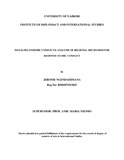| dc.description.abstract | Regionalism has emerged as a new mechanism for conflict resolution after the Cold War and has
succeeded in bringing peace and prosperity to Europe and South East Asia. Inspired by these
successes the present study analysed the potential of regionalism in the DRC, where millions of
lives have been lost in the last decade. The study found that regionalism has high potential to
resolve this conflict as the regional forces have very much involvement in the onset and
escalation of conflict. The international actors can support this effort of regional actors to
establish peace in the region. Social justice, democracy, good governance and social
development that ensure all Congolese feel safe and secure within DRC are needed to stop the
activities of local militant groups. In addition, through mutual trade, agreements and integration,
economic and political interdependence can be established between the neighbouring countries
in order to avoid conflict in the African Great Lakes region. The main role for the international
actors is to support regionalism in Africa and facilitate the peace process in the region without
directly intervening in the internal matters of African States | en_US |

